This one is lightweight and compact. Shows a lot of handle to facilitate an easy and controlled four finger draw. It features the ‘cup’ that works like a funnel, guiding your blade, making resheathing the knife very easy. An audible and feelable smooth ‘klack’ tells you that the knife is in place. It can be carried high, low, and on a dangler, and is easy to operate in all positions.
It’s very weather resistant, and easy to maintain.
The liner is made of 1.5 mm kydex which is wrapped around the spine of the blade. This method makes sure that the blade doesn’t rattle inside the sheath, and it offers some friction on the sides. It also assures that the edge of the blade is not in contact with the kydex, and will not blunt when drawing and resheathing the knife often.
It’s very weather resistant, and easy to maintain.
The liner is made of 1.5 mm kydex which is wrapped around the spine of the blade. This method makes sure that the blade doesn’t rattle inside the sheath, and it offers some friction on the sides. It also assures that the edge of the blade is not in contact with the kydex, and will not blunt when drawing and resheathing the knife often.
The kydex also provides ease of cleaning. It’s o.k. to rinse it out under water when it gets clogged or dirty. The leather is waxed from the inside, and doesn’t see any abrasion at all, so it’s very waterresisitant, if not waterproof. There’s a draining hole in the bottom of the sheath.
The pouch is made from a single piece of 2 - 3mm halftanned leather and wetformed around the liner and the knife. It’s waxed inside out, and then glued and saddlestitched with waxed tigerthread.
The difference between halftanned and vegetable tanned leather, which is most commonly used, is that halftanned has a core of rawhide and is therefore much harder to pierce or cut. It's also much stiffer and keeps it's shape better. It's much less sensitive to water and moisture and with the proper treatment extremely weatherproof.
The thread is sunken in the leather everywhere, and so protected from abrasion. There’s no thread on the inside of the sheath, so there’s no contact between the knife and stitching anywhere inside the sheath. There’s a small welt to protect the stitching at the entrance of the sheath.
The edges of the leather are polished all around, protecting it from moisture and dirt.
The leather is finished with Fiebings professional oil dye and sealed with Sno Seal, which mainly consists out of beeswax.
The edges of the leather are polished all around, protecting it from moisture and dirt.
The leather is finished with Fiebings professional oil dye and sealed with Sno Seal, which mainly consists out of beeswax.
the try-outs
slim profile
the loop is placed a little forward, to make 4 finger drawing real easy.
all bushies :)
lappleather vs halftanned
the right one has a 3 finger draw, and a 2.4 mm kydex liner
To be sure this sheath will perform as expected under different circumstances your bound to encouter when actually Crafting Bush with this baby, I have put it through these 'tests'.
Drowned the sheath under water for an hour.
There’s no shrinkage or widening of the fit. Retention stays the same.
Let it dry in the sun (27 degrees C, 81 degrees F)
The water dries quickly from the leather. No water is soaked up by the leather. The sheath is completely dry after 15 minutes. The fit hasn’t changed.
Put a soaked sheath in the freezer at -18 C (-0.4 F)
The leather stiffens up, but knife fits as it did before, retention and functionality is unchanged.
Thanks!
m a r t i n
UPDATE MAY 2010
Also this model has undergone some small changes.
The stitching on the beltloop is positioned a bit higher to achieve better balance when carried high.
And the tip, or bottom of the sheath is cut of a little bit shorter, so one can really look through it. The curled tip served no purpose other then trying to look a little bit Scandi.
Here are some later sheaths I made following this pattern



















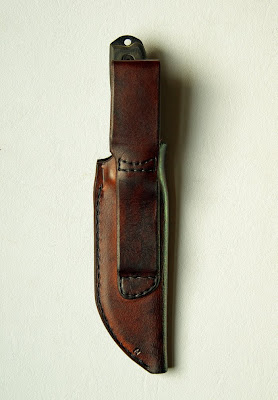




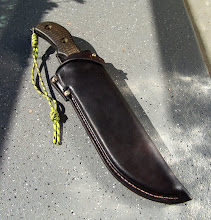


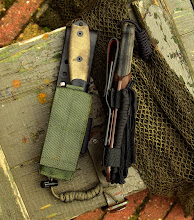

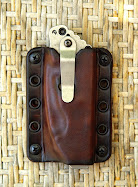
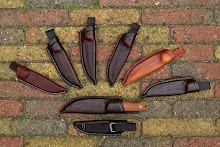
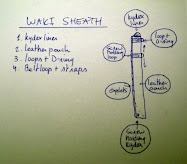
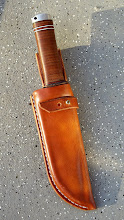
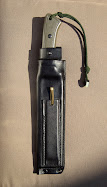
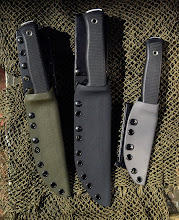
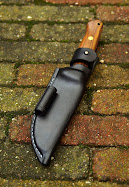

























1 comment:
great work
Post a Comment